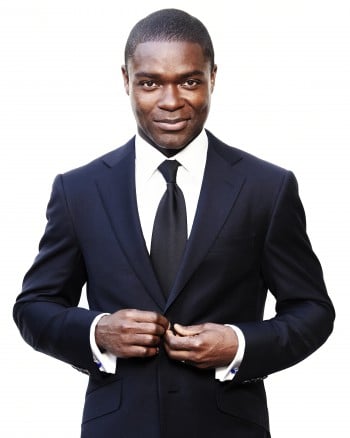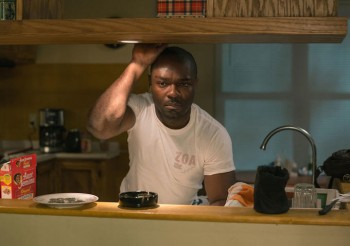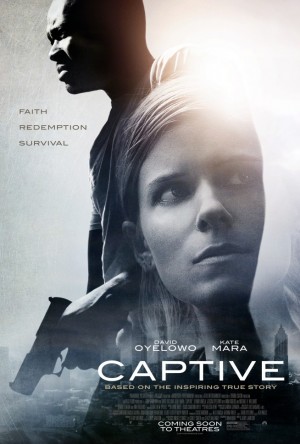 Actor David Oyelowo made a big impression on American moviegoers as the star of the Christopher Award-winning film “Selma,” in which he portrayed Rev. Martin Luther King Jr. But David has been a successful actor both in England and the United States for some time. He’s had roles in movies like “The Help” and “Lincoln” – and he’s even part of the Star Wars universe doing the voice role of Imperial Agent Kallus on the animated series “Rebels.”
Actor David Oyelowo made a big impression on American moviegoers as the star of the Christopher Award-winning film “Selma,” in which he portrayed Rev. Martin Luther King Jr. But David has been a successful actor both in England and the United States for some time. He’s had roles in movies like “The Help” and “Lincoln” – and he’s even part of the Star Wars universe doing the voice role of Imperial Agent Kallus on the animated series “Rebels.”
David has now added another meaty role to his resume with the movie “Captive,” which opens Friday September 18. Based on a true story, he plays escaped murderer Brian Nichols, who took single mother Ashley Smith hostage in 2005 while trying to hide from police. (Read my interview with Ashley.) David joined me recently on “Christopher Closeup” to discuss the movie along with the ways his Christian faith figures into his acting choices. Here are some excerpts from our conversation.
 Tony Rossi: One of the things I loved about your performance as Brian Nichols in “Captive” is that you took a man who murdered four people – who it would be easy to dismiss simply as evil – and you found that sliver of humanity in him that made him a three-dimensional character. Was that one of the appeals of this real-life character for you. How did you approach playing him?
Tony Rossi: One of the things I loved about your performance as Brian Nichols in “Captive” is that you took a man who murdered four people – who it would be easy to dismiss simply as evil – and you found that sliver of humanity in him that made him a three-dimensional character. Was that one of the appeals of this real-life character for you. How did you approach playing him?
David Oyelowo: I think whenever you’re playing a real life human being, there’s nothing to be gained from playing someone who is one-dimensional. And of course, even though Brian did kill four people that day – and bludgeoned the prison guard, Cynthia Hall, who’s still suffering with those injuries – he was still a human being. But I think that the power of this story is that it was his interaction with Ashley Smith that brought out his humanity. On that day, he had reduced himself to a monster, he did kill four people cold bloodedly. It wasn’t until she begged him to spare her life and had an interaction with him that was a human one – one where they both held a mirror up to each other because Ashley was a meth addict, who had made terrible choices herself which had kept her away from her daughter in the same way that [Brian’s] choices had kept him away from his son. So I think they found this common ground that reheated, as it were, their humanity with each other and helped both of them turn a corner on that tragic day.
TR: One of the other aspects of the story that is so key is that it’s a story in which God makes Himself present in these really unusual circumstances. As a Christian yourself, how did you respond to that aspect of the story and that idea that God can show up in the most unlikely times and places?
David Oyelowo: It really spoke to me because what happened to me personally as a teenager, even though I was brought up in a Christian household, [the faith] wasn’t necessarily true for me. It wasn’t until I heard God speak to me very personally and say, “David, there is nothing you can do to make Me love you less,” that was my revelation moment. That was the point beyond which I went on to become a born again Christian. So that is absolutely the case for Ashley Smith in this situation. Ashley herself, who was on set with us for a lot of the shoot, said that she had watched the news that day, she had seen Brian Nichols had broken out of the courthouse jail and killed four people. And suddenly at 2 a.m. that night, he was in her apartment. She felt that this was God’s way of saying, “You have messed up so badly, you deserve death.” That’s the esteem she had for herself. But it was actually the opposite. Redemption was there for her, a second chance was there for her. And it’s stupendous that it took this rock bottom moment for her to have her life turned around and realize that God’s purpose for her life was greater than anything she could have perceived for herself also.
TR: You just mentioned the word ‘redemption.’ I know that you pray when you choose roles. You really think about the movie and the story and the character. As a Christian and an actor who can get into the minds of so many different types of people, what do you think in general about this human possibility of choosing redemption?
David Oyelowo: Redemption is a gift, really. We make choices that are questionable that we’d love a second chance from. But for me personally, one of the amazing things about God’s grace is that it is perpetually redemptive, that you can have people who have done terrible things and there is still hope for them, there is still forgiveness for them. And particularly in the case of Ashley Smith. She never touched [meth] again beyond this event. She regained custody of her daughter. She has gone on to become an advocate and ambassador for ‘Celebrate Recovery,’ helping thousands of people who are in recovery from the very drug that held her captive. That, to me, is the definition of redemption. It takes a certain degree of self-love, being able to forgive yourself – and to be able to embrace the fact that forgiveness and redemption and grace [are] there for everyone who is willing to turn up and accept what God is freely prepared to give.
TR: In addition to grace, the other big aspect of this story is purpose because Ashley read to Brian Nichols from Rick Warren’s book “The Purpose Driven Life.” Were you familiar with the book before working on the movie, and has this idea of a purpose-driven life shaped your won life and career?
David Oyelowo: It has in many ways, and I did read the book. I read it far before I knew anything of the Ashley Smith-Brian Nichols story. For me, when I read the book, the inspiration I derived from it is the fact that God’s purpose for my life far transcends the purpose I could ever envisage for myself if I’m willing to embrace God and surrender to Him.
TR: I know your father faced racism when you were growing up while in England, even before you were born. How did he deal with it in a way [that didn’t make him] a bitter, resentful person? He seems like a very positive person, which you are also. How did the two of you accomplish that positive outlook?
David Oyelowo: I was brought up in a Christian household and my parents are believers. That’s been the rock of their lives as it has been for me. I think when you see people and situations through God’s eyes, it’s very different than seeing it through purely human eyes. That I think is the big difference.
TR: You have said that you’re very concerned with the roles you choose because you believe stories impact the culture globally and the way people, especially young people, choose to live. How have you seen the wide impact of film and television on people?
David Oyelowo: Yeah, and that’s a very real thing. I take very seriously the fact that the industry I’m in and what I do for a living impacts how people see the world. It shows them worlds that they haven’t seen and educates them. Hopefully, it brings them hope. But a lot of the time what we see on our screens are films or TV shows that leave you feeling no hope for humanity or actually glamorize violence or the lack of morality. For me, I have a moral compass that is very much shaped by my faith, but also by being a father and what I hope as a socially responsible citizen. I’ve seen films I’ve been involved with have a huge impact on culture. “Selma,” for instance, in which I played Dr. King. That film being released at a time when there’s been so much racial tension in this country, I’ve seen it bring hope to people. I’ve seen it bring an example of how to overcome some of these situations. I’ve seen it also educate people about how things were done in the past and maybe an example of how things can be done now and in the future. That’s something I feel very privileged to be a part of. I want to continue using whatever platform I have to bring a degree of positivity to the world around me.
TR: I interviewed the screenwriter of “Captive” a while ago, Brian Bird, and he mentioned that you were a youth pastor. Did your work with young people give you a special insight into what they’re going through, how they’re living, and how movies in general can affect them?
David Oyelowo: Yeah, I teach at the youth group in my church still now, my wife and I do. I think the challenges young people face are greater now than when I was a teenager. Social media and just how much we are bombarded from every side by images, whether it be pornography or drugs or just morally questionable things that are being pumped into our homes – even through advertising, billboards, it’s everywhere. Sex sells has gone on to become a religion, really – and that’s a challenging thing for young people, especially those who are trying to stay pure, trying to live a life where they don’t ruin their lives by getting into all kinds of different things that would and could do that. I’ve seen that the challenges they face now are greater than those that I faced, so my belief is – if you’re not part of the solution, you’re part of the problem. I’ve been afforded this platform which hopefully can oxidize some of that so – you just try and do your part.
 TR: Before we wrap up,I just want to touch on the motto that influences what The Christophers do: “It’s better to light one candle than to curse the darkness.” In your life, when you have hit those times of darkness, what makes you able to light that metaphorical candle and move forward believing in a brighter future?
TR: Before we wrap up,I just want to touch on the motto that influences what The Christophers do: “It’s better to light one candle than to curse the darkness.” In your life, when you have hit those times of darkness, what makes you able to light that metaphorical candle and move forward believing in a brighter future?
David Oyelowo: In my life, I know it to be true that the light shines brightest in the darkness. My personal Christian faith and the example of Jesus Christ has been that light to me whenever I’ve had dark moments. And even though there are times when one may falter, there are times when one’s faith may be challenged, ultimately that light has never gone out for me once it was lit. That’s where I gain my hope from, that’s the rock on which my life is built, and I’ve just found it never to fail me. And that’s why I was drawn to a story like “Captive” – because it was a dark, dark day, but the light shone through. It was a pinprick of light that went on to become something that overwhelmed the darkness and helped Ashley Smith in particular turn the corner. So what I’ve seen be effective in my life is what I try to bring to my work. And that doesn’t mean shying away from the darkness. Anyone who’s read a Bible will see that is an R-rated book, some of what you see. But ultimately what you see is how the light always overwhelms the darkness through God’s grace.
(To listen to my full interview with David Oyelowo, click on the podcast link):












